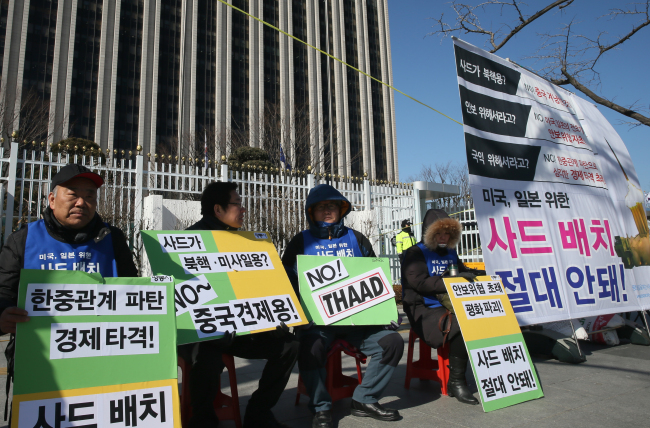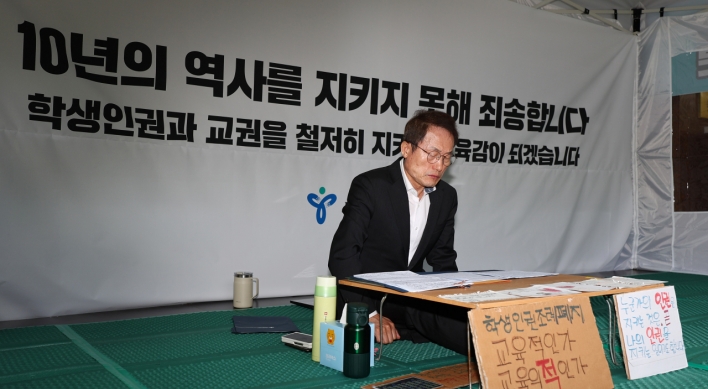[NEWS FOCUS] THAAD opposition high despite favorable poll
By KH디지털2Published : Feb. 15, 2016 - 16:14
The potential U.S. deployment of an advanced missile defense system here is facing obstacles due to the ongoing controversy over its efficacy and possible environmental threat, despite recent polls in favor of the move.
Daegu City Government said Monday that it is not the appropriate location to station the Terminal High Altitude Area Defense system, which Seoul and Washington have recently started discussing in light of inter-Korea tensions riding high.
“Deploying THAAD is a decision that the central government is entitled to make for national security. ... But while Daegu may be suitable (for THAAD) from a strategic standpoint, it is not so when one considers that it is a heavily populated city,” said Kim Sang-gyeong, a special security aide for the city at a press conference. He added that deploying the defense system has nothing to do with the city government’s move to relocate the K-2 Air Base in downtown Daegu elsewhere.
President Park Geun-hye has moved to counter North Korea‘s recent belligerence with strong moves that include shutting down Gaeseong industrial park last week. But she has encountered the bitter irony of facing fierce opposition on her THAAD plan from her own political stronghold of Daegu.
Daegu is one of five locations rumored to be potential candidates for THAAD, along with Pyeongtaek in Gyeonggi Province, Mungyeong and Chilgok in North Gyeongsang Province and Gunsan in North Jeolla Province. Civil groups along with politicians in the area have made it clear they do not want the missile system in their backyard.
Daegu City Government said Monday that it is not the appropriate location to station the Terminal High Altitude Area Defense system, which Seoul and Washington have recently started discussing in light of inter-Korea tensions riding high.
“Deploying THAAD is a decision that the central government is entitled to make for national security. ... But while Daegu may be suitable (for THAAD) from a strategic standpoint, it is not so when one considers that it is a heavily populated city,” said Kim Sang-gyeong, a special security aide for the city at a press conference. He added that deploying the defense system has nothing to do with the city government’s move to relocate the K-2 Air Base in downtown Daegu elsewhere.
President Park Geun-hye has moved to counter North Korea‘s recent belligerence with strong moves that include shutting down Gaeseong industrial park last week. But she has encountered the bitter irony of facing fierce opposition on her THAAD plan from her own political stronghold of Daegu.
Daegu is one of five locations rumored to be potential candidates for THAAD, along with Pyeongtaek in Gyeonggi Province, Mungyeong and Chilgok in North Gyeongsang Province and Gunsan in North Jeolla Province. Civil groups along with politicians in the area have made it clear they do not want the missile system in their backyard.

The main concern is the environmental risk the system may present due to its strong electromagnetic waves.
Park Jae-man, a provincial assembly member of North Jeolla Province and of main opposition The Minjoo Party of Korea, said that deployment of THAAD would result in health hazards due to electromagnetic waves, along with hindering local projects in the region and deteriorating Seoul-Beijing relations.
China has voiced strong opposition against the system, saying it would disturb balance in the region, as has Russia. Beijing claimed that THAAD is ultimately aimed at it.
A resounding “No” from Seoul’s powerful neighbors has been another reason some South Koreans remain skeptical of the new defense system.
The anti-THAAD sentiment apparently rampant across the country is in stark contrast to recent polls indicating that South Koreans are in favor of it, particularly with North Korea conducting a nuclear test and launching a long-range rocket.
About 67.1 percent of the respondents answered “yes” when asked whether “South Korea needs to arm itself with THAAD in order to counter North Korean threats,” in a survey announced Sunday by Korea Research Center commissioned by the local Yonhap news agency and KBS. Another survey by Realmeter showed that 49.4 percent thought THAAD was necessary, as opposed to 42.3 percent who disagreed with having the system in the territory.
Some, such as Pyeongtaek Mayor Gong Jae-gwang, said while they thought THAAD was necessary, they deemed it was inappropriate to deploy it in their neighborhood.
“I agree that THAAD should be deployed for our national security, but along with 460,000 citizens (of Pyeongtaek), I fervently oppose Pyeongtaek being mentioned (as a candidate),” he wrote on his Facebook page. He vowed to join efforts with the city council and lawmakers to ensure that THAAD does not set home in the city.
Critics have also voiced concern that no interception system would be proficient enough to provide an aerial blockade for the over 1,000 missiles that Pyongyang is believed to have with capacity to strike all South Korean targets. They have also pointed out that using a 11 billion won ($9.1 million) missile against much cheaper Scud and Rodong missiles -- believed to be worth around 1-2 billion won -- would be inefficient.
Defense Minister Han Min-koo attempted to downplay the health risks and other factors raised via the media and public. He told the National Assembly on Monday that the electromagnetic waves from the THAAD radar do not pose any risk if one stays more than 100 meters away from it.
Han also said that rumors over how much it takes to retain the system have been greatly inflated as the U.S. military would shoulder the costs.
The same day, the Defense Ministry said that the military efficacy of THAAD to be deployed in South Korea would be viewed from the U.S. point of view, and not South Korea's. Defense Ministry spokesman Moon Sang-kyun said: “It is because the U.S. Forces Korea will be operating it,” adding that the best location would be a place with military efficacy that enables a missile launched by North Korea to be targeted.
The comment sparked yet another dispute that the main beneficiary of the defense system would be the U.S., not Korea.
The Institute for Democracy and Policies, a think tank for the main opposition party, said via a report last year that a missile fired from the North to the South would fly at a relatively lower altitude, which means THAAD would be inefficient at intercepting such attacks.
By Yoon Min-sik (minsikyoon@heraldcorp.com)




![[KH Explains] No more 'Michael' at Kakao Games](http://res.heraldm.com/phpwas/restmb_idxmake.php?idx=644&simg=/content/image/2024/04/28/20240428050183_0.jpg&u=20240428180321)












![[Herald Interview] Mistakes turn into blessings in street performance, director says](http://res.heraldm.com/phpwas/restmb_idxmake.php?idx=652&simg=/content/image/2024/04/28/20240428050150_0.jpg&u=20240428174656)
